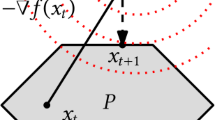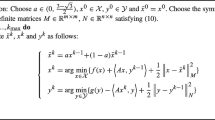Abstract
Derivative-free projection methods are very effective and highly useful methods for solving large-scale nonlinear monotone equations. A lot of research is continuously being done to either improve the existing methods or come up with other new projection methods. In this paper, we propose a scaled derivative-free projection method for solving large-scale nonlinear monotone equations, which combines conjugate gradient and projection techniques. We establish its global convergence under appropriate conditions. The method is then compared with other existing methods in the literature and preliminary numerical results indicate that the method compares very well.



Similar content being viewed by others
References
Dai, Z., Chen, X., Wen, F.: A modified Perry’s conjugate gradient method-based derivative-free method for solving large-scale nonlinear monotone equations. Appl. Math. Comput. 270, 378–386 (2015)
Ding, Y., Xiao, Y., Li, J.: A class of conjugate gradient methods for convex constrained monotone equations. Optimization 66(12), 2309–2328 (2017)
Dirkse, S.P., Ferris, M.C.: A collection of nonlinear mixed complementarity problems. Optim. Math. Soft. 5, 319–345 (1995)
Dolan, E.D., Moré, J.J.: Benchmarking optimization software with performance profiles. Math. Program. 91, 201–213 (2002)
Du, X., Zhang, P., Ma, W.: Some modified conjugate gradient methods for unconstrained optimization. Comput. Appl. Math. 305, 92–114 (2016)
Hu, Y., Wei, Z.: A modified Liu–Storey conjugate gradient projection algorithm for nonlinear monotone equations. Int. Math. Forum. 9, 1767–1777 (2014)
Liu, J.K., Li, S.J.: A projection method for convex constrained monotone nonlinear equations with applications. Comput. Math. Appl. 70(10), 2442–2453 (2015)
Liu, J.K., Li, S.J.: Spectral DY-type projection method for nonlinear monotone system of equations. J. Comput. Math. 33, 341–355 (2015)
Li, M.: An Liu–Storey-type method for solving large-scale nonlinear monotone equations. Numer. Func. Anal. Opt. 35, 310–322 (2014)
Liu, S.Y., Huang, Y.Y., Jiao, H.W.: Sufficient descent conjugate gradient methods for solving convex constrained nonlinear monotone equations. Abstr. Appl. Anal. 2014, 305643 (2014)
Meintjes, K., Morgan, A.P.: A methodology for solving chemical equilibrium systems. Appl. Math. Comput. 22, 333–361 (1987)
Solodov, M.V., Svaiter, B.F.: A globally convergent inexact Newton method for systems of monotone equations, Reformulation: Nonsmooth, Piecewise Smooth, Semismoothing methods, pp. 355–369. Springer, USA (1998)
Sun, M., Liu, J.: A modified Hestenes–Stiefel projection method for constrained nonlinear equations and its linear convergence rate. J. Appl. Math. Comput. 49(1–2), 145–156 (2015)
Sun, M., Liu, J.: New hybrid conjugate gradient projection method for the convex constrained equations. Calcolo 53(3), 399–411 (2016)
Sun, M., Liu, J.: Three derivative-free projection methods for nonlinear equations with convex constraints. J. Appl. Math. Comput. 47, 265–276 (2015)
Wang, S., Guan, H.: A scaled conjugate gradient method for solving monotone nonlinear equations with convex constraints. J. Appl. Math. 2013, 286486 (2013)
Wang, X.Y., Li, S.J., Kou, X.P.: A self-adaptive three-term conjugate gradient method for monotone nonlinear equations with convex constraints. Calcolo 53(2), 133–145 (2016)
Xiao, Y., Zhu, H.: A conjugate gradient method to solve convex constrained monotone equations with applications in compressive sensing. J. Math. Anal. Appl. 405, 310–319 (2013)
Yan, Q.-R., Peng, X.-Z., Li, D.-H.: A globally convergent derivative-free method for solving large-scale nonlinear monotone equations. J. Comput. Appl. Math. 234, 649–657 (2010)
Yuan, G., Zhang, M.: A three-terms Polak–Ribière–Polyak conjugate gradient algorithm for large-scale nonlinear equations. J. Comput. Appl. Math. 286, 186–195 (2015)
Zheng, L.: A modified PRP projection method for nonlinear equations with convex constraints. Int. J. Pure. Appl. Math. 79, 87–96 (2012)
Acknowledgements
The authors are grateful to the Editor and the two anonymous referees for their constructive comments which greatly improved this paper’s presentation.
Author information
Authors and Affiliations
Corresponding author
Additional information
Communicated by Davod Khojasteh Salkuyeh.
Appendix
Appendix
Here, we present the twelve test problems that were used in numerical experiments. These problems are as follows.
Problem 1
[7]
where \(\Omega =\mathbb {R}_{+}^{n}\). Initial guess \(x_{0}=(1, 1, \ldots , 1)^{\text {T}}\).
Problem 2
[9]
where \(\Omega =\mathbb {R}^{n}\). Initial guess \(x_{0}=(0, 0, \ldots , 0)^{\text {T}}\).
Problem 3
[7]
where \(\Omega =\mathbb {R}^{n}\). Initial guess \(x_{0}=(0, 0, \ldots , 0)^{\text {T}}\).
Problem 4
[7]
where \( \Omega =\mathbb {R}^{n}.\) Initial guess \(x_{0}=(1, 1, \ldots , 1)^{\text {T}}\).
Problem 5
[19]
where \(\Omega =\mathbb {R}^{n}\). Initial guess \(x_{0}=(1, 1, \ldots , 1)^{\text {T}}\).
Problem 6
[2]
where \(\Omega =\{x\in \mathbb {R}^{n}|\sum _{i=1}^{n}x_{i}\le n, x_{i}\ge 0, i=1,2,\ldots ,n\}\). Initial guess \(x_{0}=(-1, -1, \ldots , -1)^{\text {T}}\).
Problem 7
[20]
where \(h=\frac{1}{n+1}\) and \(\Omega =\mathbb {R}^{n}\). Initial guess \(x_{0}=(\frac{1}{2}, \frac{1}{2}, \ldots , \frac{1}{2})^{\text {T}}\).
Problem 8
[19]
where \(\Omega =\mathbb {R}^{n}\). Initial guess \(x_{0}=(10, 10, \ldots , 10)^{\text {T}}\).
Problem 9
[2]
where \(\Omega =\mathbb {R}^{n}\). Initial guess \(x_{0}=(0, 0, \ldots , 0)^{\text {T}}\).
Problem 10
[2]
where \(\Omega =\mathbb {R}^{n}\). Initial guess \(x_{0}=(-1, -1, \ldots , -1)^{\text {T}}\).
Problem 11
[2]
where \(\Omega =\mathbb {R}^{n}\). Initial guess \(x_{0}=(2, 2, \ldots , 2)^{\text {T}}\).
Problem 12
[7]
where \(\Omega =\mathbb {R}_{+}^{n}\). Initial guess \(x_{0}=(1, 1, \ldots , 1)^{\text {T}}\).
Rights and permissions
About this article
Cite this article
Koorapetse, M., Kaelo, P. & Offen, E.R. A Scaled Derivative-Free Projection Method for Solving Nonlinear Monotone Equations. Bull. Iran. Math. Soc. 45, 755–770 (2019). https://doi.org/10.1007/s41980-018-0163-1
Received:
Revised:
Accepted:
Published:
Issue Date:
DOI: https://doi.org/10.1007/s41980-018-0163-1




